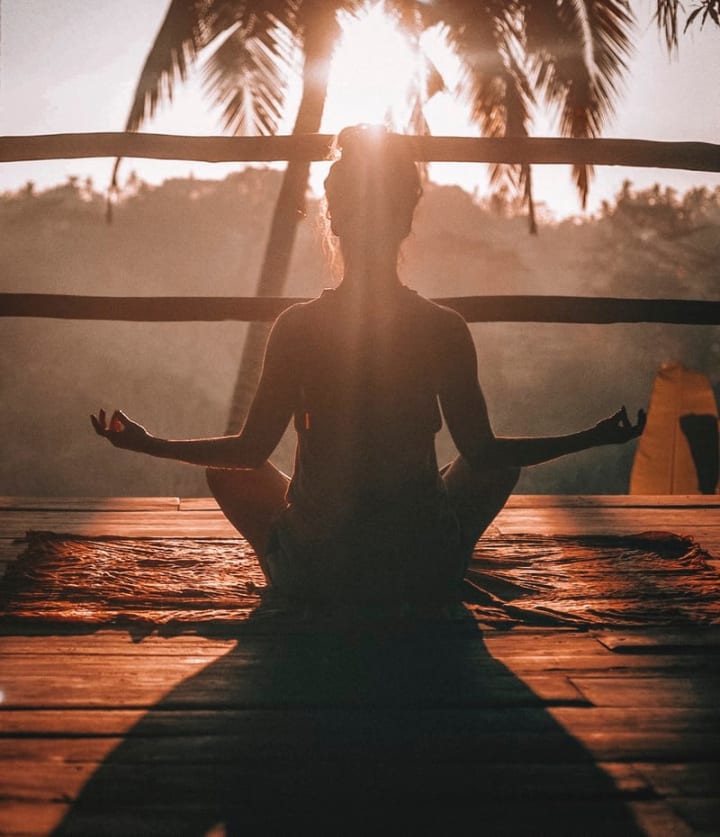Staying sane during the global turbulence.
And why its essential for one’s health.

I was planning to write this article for some time now, since anxiety is a worldwide problem that affects a lot of people. My initial idea was to just share some tools aka coping mechanisms, that helped me in the past. This was my plan until recently, and while I will still execute it , in the light of recent events I feel it’s my duty to add something equally important.
By recent events I mean the global virus pandemic, that is currently making so many people extremely fearful. I won’t tell you how to wash your hands , or teach you how to prepare a homemade hand sanitizer. There is enough information on that, and hopefully by now we learned a thing or two about the physical hygiene. However, it is the more subtle hygiene I feel very passionate about. Your mental health needs to be protected as much, if not more than the physical. Fear and panic left unchecked, are as parasitical as any virus. If not more.
This is something that seems to skip the attention of so many, especially in times like this. Our mental health is just as real as the physical one, and the two are interconnected at all times. While fear might seem like an essential ingredient to one’s survival, it was only meant to be so short term - when our ancestors had to either run away from, or fight the enemy aka the wild animal. Hence - “fight or flight response”, during which our bodies are flooded with the stress hormones, which I repeat - is ok short term, but can create a lot of damage long term, if not taken care of. Deteriorating mental health can weaken the physical body and potentially lead to more serious health problems. Worrying yourself sick is a thing. Which is why we need to take a full responsibility for our inner landscapes, which in turn will create a stronger immunity and help fight whatever threat our bodies might be under. Luckily, whatever makes us calmer and happier, also boosts our immune system.
Below I will share some of the tips on coping with anxiety when it strikes , but self- awareness is still at the top of the list when it comes to these things, and while it takes time and effort to master it - I believe it’s the only long term solution. It’s certainly not easy, especially if everyone around us is panicking, however this is precisely when the true -self mastery can be attained, while the world around us seemingly collapses, and we must call on our inner strength. Let’s get to my top 7 of calming strategies then.
1. Conscious breathing.
The most powerful and yet under-utilised tool is simple and complex all at the same time. We breathe every second of our lives, and yet when in the middle of an episode of anxiety, it proves very difficult to breathe properly. Our breath becomes shallow, and an effort is needed to breathe deeply. I would repeatedly forget about this simple truth myself, and yet it’s something we have an access to at all times. While there are countless breathing techniques available online, I find simple belly breaths to be the most effective , as well as locating the fear in ones body (there’s always an epicentre if we try to find it), and breathing directly into it. Imagining light entering your body on the inbreath, and all negativity leaving it on the outbreath can add a significant value if we are able to visualise the process.
2. Yoga.
While nearly any form of exercise is going to be beneficial for keeping stress levels down , yoga is definitely at the top of the list. I would always feel so much better after a class of Hatha yoga. It incorporates deep breathing and stretching during various asanas (yoga postures), which has a tremendous healing affect on all aspects of our health. Little less known fact is that during a yoga class, there is a release from the deep tissues of our bodies, where amongst other things, we store negative emotions , that literally get trapped there, which is why a regular yoga practice can even help to address some deep seated emotional trauma.

3. Connecting with other beings.
Professional therapy is great if one can afford it. Therapists are trained to hold the space for human suffering, keep a non judgmental attitude, they are equipped with in depth knowledge about our psyche, and more often than not are highly empathetic. It’s the relationship and trust we build with them, that is creating an alchemy and a save container to process all our emotions. Then there are friends and loved ones, who are even more valuable, albeit in a different way. Friends are a family we choose and they are our trusted network of support, that is there unconditionally. Even if it’s just one person, meaningful connection is soothing and calming for both sides. Sharing your worries gets them out of your system, and creates a more realistic perspective. Spoken words is one way to get the negative energy out, some other options that come to mind are crying and writing things that bother you on the piece of paper. While in the grip of fear, we tend to imagine worst case scenarios, and discussing it with someone else, can often paint a less dramatic picture. However, in times like this, there is no way to predict how well people will cope, and whether they will be able to be there for others. When the event is global, everyone is potentially affected, which is the only reason why therapy came up on top of the list in this case. However, in times like that the unity can also be felt strongly, given that people stay supportive of each other and don’t fall too deeply into negativity.
Another option, albeit not available to all, and yet extremely soothing, is to connect to ones pet. While they are unable to speak - their presence in itself is calming, and stroking a purring cat is one of the top ways to relax in our household.
“I have lived with several Zen masters - all of them cats.”
Eckhart Tolle.

4. Connecting to Nature.
During one of my most severe episodes of anxiety few years ago, I discovered the most amazing thing totally by chance. Since I live very close to the park, I happened to favour a spot next to one tree, to be more precise on top of its roots, that happened to come out of the ground and conveniently create a space for one to sit on. While I always enjoyed resting there with my back leaning fully on the tree, during my anxious state to my surprise, I noticed it was highly therapeutic. In fact, almost nothing produced as instant effect in my especially severe states - in the mornings post yet another sleepless night. I have since learned that depending on what kind of a tree you choose to connect to, the effect might differ. Some trees like oaks will energise you, while others like maple will transmute the negative energy into the positive, and relax you as a result, which explains what happened to me.

5. Magnesium supplement.
Works wonders if taken in the right dosage, especially if your sleep is affected by anxiety, and let’s face it - more often than not , it is. However, not every kind of magnesium will be equally good for the nervous system. Definitely avoid Magnesium Oxide, which is the cheapest one on the market. Supposedly the best one to use would be Magnesium Biglycinate, but very first time I tried this remedy - I bought Magnesium Citrate by brand called “Solgar” and also felt the difference.
Another supplement to explore is an Ayurvedic herb called Ashwagandha. Some of my friends swear by it.
6. Essential oils.
Oh, how I love this one . It is truly a whole new world of sensual experience, which is so fun to explore. My number one oil for the calm and relaxation is still Lavender, as well as some citrus oils like Bergamot , but I promise you - once you get the taste of this journey, or should I say the smell of it , your curiosity will be awakened. There are so many oils to play with for all kind of purposes. More focus, less brain fog, more confidence, less overthinking, more energy, better sleep, better sex drive, better immunity. The list goes on and those oil burners are so very cute! By the way, while we are on the immunity subject, Tea tree oil is amazing for that. Aromatherapy is a powerful tool, reason for that being - it works by accessing and stimulating certain brain zones, that are able to directly communicate with our subconscious.

7. Gratitude
I’m addressing this the last only because I have written about it on the numerous occasions before, most recently on my social media, and hence hoping it is still fresh in peoples minds. Also, it’s a practice that will more likely work over a period of time, rather than immediately. What makes this even more topical, is that there actually was a research that showed how gratitude improves the immunity of people. Which to me is not surprising at all, because as I mentioned earlier, positive emotions are essential both for the immune system, and for the mental health. When we feel thankful, we feel calm, as opposed to fearful. While extremely complex in many ways, human brain is also quite simple in other ways. We are wired to focus on the negative. It served us well as species, to scan the environment for the potential dangers and to remember negative scenarios vividly in order not to repeat them. This was handy for an early human. Since then the world has changed, but this tendency is still there, in the more ancient parts of our brains. Even in the relatively calm times, we love to complain, mostly about little things. When, times become stressful however, the ability to feel gratitude completely disappears. Which is why we need to start rewiring our brains and calming our amygdalas , by focusing on things we are thankful for daily. Even if it’s just a nice meal, a sunny day, or our ability to use Internet to connect to people all over the world. So many things we are taking for granted. What if we started writing them down in a gratitude journal instead ? Then by the time the pandemic was over, we would emerge able to appreciate life fully.

Those were some ways to support our systems in this challenging time, I will explore more in my future articles, but meantime, look after yourself - in body, mind and spirit.
About the Creator
Eva Smitte
Writer, model, mental health advocate. Instagram @eva_smitte






Comments
There are no comments for this story
Be the first to respond and start the conversation.